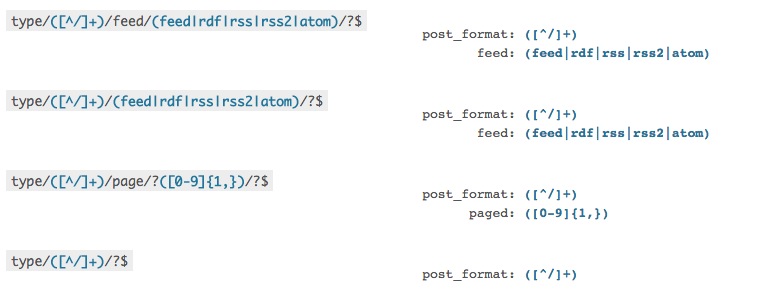The post format taxonomy:
The post format is a default taxonomy, registered with:
register_taxonomy( 'post_format', 'post', array(
'public' => true,
'hierarchical' => false,
'labels' => array(
'name' => _x( 'Format', 'post format' ),
'singular_name' => _x( 'Format', 'post format' ),
),
'query_var' => true,
'rewrite' => $rewrite['post_format'],
'show_ui' => false,
'_builtin' => true,
'show_in_nav_menus' => current_theme_supports( 'post-formats' ),
) );
where
$rewrite['post_format'] = $post_format_base ? array( 'slug' => $post_format_base ):false;
and
$post_format_base = apply_filters( 'post_format_rewrite_base', 'type' );
Note that the taxonomy slug is post_format and the rewrite slug is type.
The post format terms:
We can see the available post formats from the get_post_format_strings() function:
/**
* Returns an array of post format slugs to their translated and pretty display versions
*
* @since 3.1.0
*
* @return array The array of translated post format names.
*/
function get_post_format_strings() {
$strings = array(
'standard' => _x( 'Standard', 'Post format' ), // Special case. any value that evals to false will be considered standard
'aside' => _x( 'Aside', 'Post format' ),
'chat' => _x( 'Chat', 'Post format' ),
'gallery' => _x( 'Gallery', 'Post format' ),
'link' => _x( 'Link', 'Post format' ),
'image' => _x( 'Image', 'Post format' ),
'quote' => _x( 'Quote', 'Post format' ),
'status' => _x( 'Status', 'Post format' ),
'video' => _x( 'Video', 'Post format' ),
'audio' => _x( 'Audio', 'Post format' ),
);
return $strings;
}
The terms have the slug post-format-{$format} where $format can be one of:
aside, chat, gallery, link, image, quote, status, video, audio
where standard is not included.
The post format rewrite rules:
Here you can see the corresponding generated rewrite rules:

according to the Monkeyman Rewrite Analyzer.
The post format public queries:
We can therefore use the following public queries:
http://example.tld/type/post-format-aside/
http://example.tld/type/post-format-chat/
http://example.tld/type/post-format-gallery/
http://example.tld/type/post-format-link/
http://example.tld/type/post-format-image/
http://example.tld/type/post-format-quote/
http://example.tld/type/post-format-status/
http://example.tld/type/post-format-video/
http://example.tld/type/post-format-audio/
to display all posts in a given post format.
Update:
@ToddBenrud said he managed to get:
http://example.tld/type/image/
to work.
The reason for that is the following request filter:
/**
* Filters the request to allow for the format prefix.
*
* @access private
* @since 3.1.0
*/
function _post_format_request( $qvs ) {
if ( ! isset( $qvs['post_format'] ) )
return $qvs;
$slugs = get_post_format_slugs();
if ( isset( $slugs[ $qvs['post_format'] ] ) )
$qvs['post_format'] = 'post-format-' . $slugs[ $qvs['post_format'] ];
$tax = get_taxonomy( 'post_format' );
if ( ! is_admin() )
$qvs['post_type'] = $tax->object_type;
return $qvs;
}
add_filter( 'request', '_post_format_request' );
This means that a request with the query variable:
Array
(
[post_format] => image
)
is modified to the correct term name:
Array
(
[post_format] => post-format-image
[post_type] => Array
(
[0] => post
)
)
So we could also use:
http://example.tld/type/aside/
http://example.tld/type/chat/
http://example.tld/type/gallery/
http://example.tld/type/link/
http://example.tld/type/image/
http://example.tld/type/quote/
http://example.tld/type/status/
http://example.tld/type/video/
http://example.tld/type/audio/

